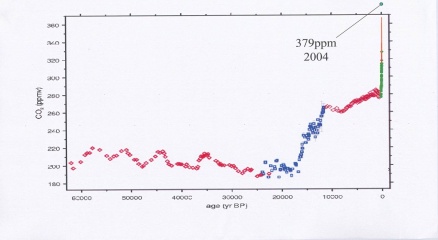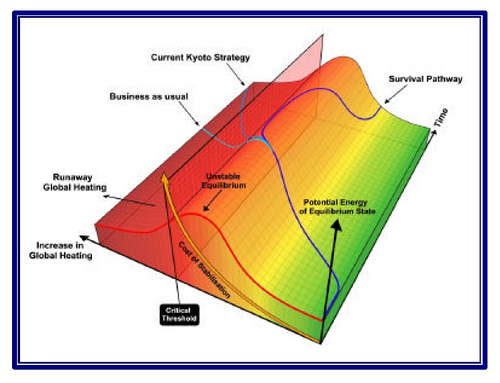What is climate change?
|
|
The term climate change refers to all forms of climate inconsistency, but because the Earth's climate is never static, “climate change” signifies a significant change from one set of climate conditions to another.
In the context of environmental policy, climate change or global warming usually refer to changes on modern climate caused by human made CO2 concentrations in the atmosphere. This is still a theory trying to establish two ‘cause and effects’: firstly that CO2 is the cause of global warming, and secondly, that humans are causing it through the burning of fossil fuels.
|
Some facts and figures
|
|
The International Panel on Climate Change, IPCC, is an international body of scientists researching Climate Change. This United Nations study, which was awarded the 2007 Nobel Peace Prize, was the most comprehensive study of peer reviewed climate research ever undertaken, and one of the most comprehensive studies of any scientific question ever.
The 4th IPCC Climate Change Report published in 2007 states:
- Warming of the climate system is unequivocal, as is now evident from observations of increases in global average air and ocean temperatures, widespread melting of snow and ice and rising global average sea level[1].
- Global GHG emissions due to human activities have grown since pre-industrial times, with an increase of 70% between 1970 and 2004.[2].
- Most of the observed increase in globally averaged temperatures since the mid-20th century is very likely (confidence level >90%) due to the observed increase in human greenhouse gas concentrations.
The IPCC report conclusions are that climate change is an empirical fact. The only question worth asking is how fast we can act to create real reductions in atmospheric CO2.
C02 levels over the past 60,000 years.
Source: Training for Transition, TTT, 2007.
Carbon dioxide is not, however, the only greenhouse gas affecting climate. Experts also warm that other greenhouse gases, such as methane, sulfur hexafluoride, hydrofluorocarbons and perfluorocarbons, are also directly involved in most of the increases in global average temperatures since the mid-20th century".[3].
|
The road to Copenhagen
|
|
COP15 is the popular name for a conference that will take place under the general framework of the United Nations Climate Change Conference 2009, 7–18 December at the Bella Center, Copenhagen, Denmark. This conference represents the 15th Conference of the Parties – hence the name – to the United Nations Framework Conventions on Climate Change. Copenhagen 2009 will include the 5th Meeting of the Parties (COP/MOP5) to the Kyoto Protocol.
The conference is significant as it is scheduled to come up with the next binding agreement after the first stage of the Kyoto protocol expires in 2012. Environmentalists are putting pressure on governments to achieve tough and legally binding carbon descent targets, highlighting the ineffectiveness of the Kyoto targets, which are far from being met by most states. COP15 is also being hailed as historically important as failure to reach an effective agreement may signify the end of hope in top-down government and business led climate change strategy.
The graph below shows the path of current Kyoto strategy which takes us over the red tipping point (using IPCC's most recent reports) and into 'runaway' or unstoppable climate change (caused by a number of natural knock on effects or 'positive feedbacks' which kick in once a certain carbon concentration is reached). The action needed to address this devastating threat is rapid carbon descent, translating into deep cuts in the activities of carbon heavy industries and energy production, and a matching decrease in consumption. Despite this, in mid November 2009 President Obama and other world leaders announced their plan to delay any agreement until after the Copenhagen summit, pushing urgent issues into the future.[4]
At the same time climate change denial is on the increase in Britain. Only 41% of those surveyed by a recent Times newspaper poll believed climate change was anthropogenic (man made) despite established science to the contrary. [5]
|
|
|


